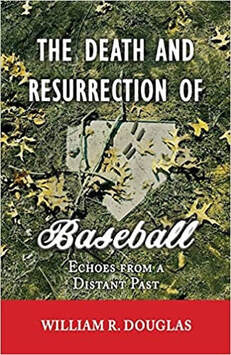
But what about baseball in the future? What if it disappears from the American landscape? Could it ever make a comeback?
Those are some of the themes that first-time author William R. Douglas addresses in his novel, The Death and Resurrection of Baseball: Echoes from a Distant Past (Woodbridge Publications; $29.95; hardback; 252 pages).
Inspired by themes from movies like Field of Dreams and The Sandlot and weaving elements from David Aikman’s When the Almond Tree Blossoms and William Forstchen’s One Second After into his narrative, Douglas tells a futuristic story of hope, the return of family dynamics and what these days appears to be a lost art — getting along with others even if their beliefs are at opposite ends of the spectrum. There is also some baseball names bandied about — directly and indirectly —that will bring smiles to Chicago sports fans.
There are even a few casual references to the 1989 film, Bill & Ted’s Excellent Adventure and 1984’s The Natural.
It is 2166, more than a century after a second Civil War had devastated the U.S., killing millions of people. The nation has returned to “horse-and-buggy” mode after a computer virus wipes out data worldwide. Sports are played, but the emphasis is on soccer and lacrosse. Video games (then as now) have taken up the attention of youths.
Baseball is nowhere in sight, ever since a crippling three-year players strike. Then, a 5,000-pound bomb was dropped on a stadium in Charlotte, North Carolina, on April 11, 2061, killing 1,776 people. Note the irony. The next day, the Second Civil War began, 200 years to the day after the first Civil War began. Double irony.
These elements play to Douglas’ strengths. Graduating in 1980 with a degree in journalism, he eventually worked in the information technology field. Add to that his love for history and Chicago sports — particularly the White Sox — and Douglas pulls that knowledge into a compelling narrative that centers around his own hometown of McHenry, Illinois.
Joe Scott, a 12-year-old living in McHenry, is exploring in the VFW Woods — a no man’s land that was once the site of the Second Civil War’s bloodiest battle. Scott is walking with a friend when he finds a puzzling relic. It is a sign attached to a fence that reads “No Pepper.” Baseball fans in our time knows what that means, but in Douglas’ narrative the sport vanished from American culture more than a century ago.
Scott’s father tries to figure out what it means.
That is where Grandpa Moses steps in.
Brian Albert Woodbridge is 85 and a member of the revered Crucible Generation. Those were the people who had to deal with the immediate aftermath of the Second Civil War. Affectionately known as Grandpa Moses, he lives in Dyersville, Iowa (there’s that Field of Dreams tie-in) and remains a can-do guy. He is a former congressman who won his seat at age 65 and can drive a big-rig truck, a rarity in these times.
What Grandpa Moses also has is a trunk in his attic that contains a secret. “The property of a pirate, filled with gold and priceless gems,” he muses. When Joe Scott and his younger brother Austin come to visit, Grandpa Moses decides the time is right to find out what is in that mysterious trunk.
There is no gold, but the relics are priceless.
 William R. Douglas
William R. Douglas The letter instructs them that there are two vaults buried in the backyard behind the farmhouse in Dyersville, and they discover more baseball relics, including a copy of “The Sandlot.”
“Baseball, huh. It looks like fun,” Joe Scott says.
It was. And the players take to the game quickly. Baseball suddenly becomes a national craze and a way for Americans to bond again. After a local newspaper reporter — go figure, newspapers were back in vogue in 2166? — and national media show interest, even the president weighs in. But Scott and his friends had to learn the game.
“It was one thing to watch movies and read books,” Douglas writes. “It was quite another to do what they were learning.”
The players compete vigorously, but show good sportsmanship and find themselves enjoying the nuances of the sport. Even the fans put away their differences and simply enjoyed the game.
It was a sentiment that Grandpa Moses thought about what mesmerized him about the old ballgame. He reached back into a behavior he had read about.
People were polarized, where it seemed as if “half of America had developed a hatred for the other half,” that led to the deaths of 90% of the U.S. population.
But a steadying influence was baseball.
“When the game was over and the seats emptied, everyone who had come in peace, left in peace,” he said.
While the baseball strike did not cause the Second Civil War, it removed decency that was exhibited through sports.
As a sidebar, when Grandpa Moses and Scott are invited to fly in a U.S. Army plane over the ruins of Chicago, they get to see some of that destruction firsthand. But the reason they were invited soon becomes apparent. The area is still crackling with radiation after an exchange of nuclear weapons caused the deaths of 80 million people in one day. But as the plane flies over the former South Side of Chicago, they see a partial structure that brings back memories of the old ballgame — Comiskey Park.
Douglas uses plenty of Chicago baseball references in his novel. Many are fun to find.
When a game is scheduled, with the president in the stands and a national television audience watching, other dignitaries arrive.
They include Illinois senators Beckert and Baines — could Douglas be referencing former Cubs infielder Glenn Beckert and White Sox Hall of Famer Harold Baines? There’s also a congresswoman named Barton, but it would have been funnier if she had been named Bartman (Cubs fans can wince now).
Bill Evans, Ned Chylak, Dave Eddings and August Donatelli are the umpires for the big game, and there’s some nostalgia there.
All of the real-life umpires have ties to Chicago. Billy Evans was a Hall of Fame umpire who worked the day Charlie Robertson pitched a perfect game for the White Sox in 1922. Nestor Chylak umpired the Toronto Blue Jays’ first-ever game, which was played against the White Sox in 1977. Doug Eddings was the plate umpire for Game 2 of the 2005 ALCS that involved the infamous dropped third strike while A.J. Pierzynski was batting. And he also was the plate umpire when White Sox pitcher Carlos Rodon tossed a no-hitter in April 2021.
And Augie Donatelli umpired a 1956 doubleheader between the Cubs and Braves that saw 15 home runs hit at Wrigley Field.
Reggie Spalding, who plays a part at the end of the novel, is a direct descendant of former baseball Hall of Famer and sporting goods pioneer Albert Spalding. The real-life Spalding, who developed the first baseball deemed “official” by the majors, opened his first store in Chicago.
The host of the “Good Morning, USA” that televises the game between the White Stockings and Bear Cubs is Laura Tubman, whose seventh great-grandmother was Underground Railroad heroine Harriet Tubman. The president, named Frederick Kennedy, is a Black Irishman whose genealogical branches include former presidents John F. Kennedy and Ronald Reagan.
Douglas is ever mindful of the impact the original Civil War had on America. In Kennedy’s dedication before the big baseball game, he references the Gettysburg Address, with an opening statement of “five score and seven years ago.”
I won’t give away the outcome of the game, but there are more Chicago references. When Scott’s rival Ted Lee Banks hits a home run in the eighth inning, the baseball broadcaster dusts off a “Hey, hey!” like Cubs announcer Jack Brickhouse did when Ernie Banks hit his 500th career home run on May 12, 1970.
There is also a player for the Bear Cubs named Roy Hobson, a nod to The Natural’s Roy Hobbs.
My favorite reference, though, is that the producer of “Good Morning, USA” is named Arnie Harris. If you followed Cubs baseball and announcer Harry Caray on WGN-TV, you know that the producer of the broadcasts was Arne Harris, who worked the games from 1964 until his death in 2001. The president of American News Network, which produced the fictional game in Douglas’ novel, was Harry Scully, a nice juxtaposition of Caray and Dodgers immortal broadcaster Vin Scully.
Maybe I am reading too much into all of these references, but I believe they were put there intentionally. They were fun to read.
If there is a criticism with Douglas’ book, it is that the climactic game has too much dialogue between the announcers. But that is a universal complaint even in 2023. It does not detract from the overall presentation; baseball fans will enjoy it.
For the most part, the dialogue and narrative is good. There is genuine wonderment that a game that seemed so ancient could make people enthusiastic and relearn the art of agreeing to disagree.
It is a nice moral theme.
Douglas’ book ends with a scene in heaven, with Jackie Robinson announcing the return of baseball after a century. Babe Ruth, Lou Gehrig and even Shoeless Joe Jackson marvel at the game’s return, but leave it to heaven’s Big Guy to have the final say.
“Let’s play ball!”
The Death and Resurrection of Baseball is a book brimming with hope. Douglas’ themes are not preachy, but they make one think. As they should.
The novel speaks to family values, patriotism and the love of a game that may seem dead to some but still has remarkable resiliency.
 RSS Feed
RSS Feed
